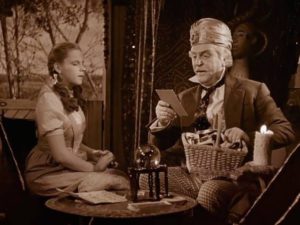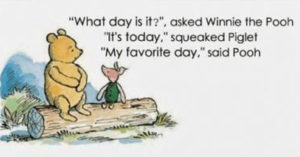We explored this question at a recent meeting of the Santa Barbara Tarot Circle. We meet each month in Santa Barbara and discuss tarot related topics and read cards. I manage the group. This article comes from my notes for this meeting.
Some quotes from Albert Einstein concerning time:
“Time and space are not conditions in which we live, but modes by which we think.
Physical concepts are free creations of the human mind, and are not, however it may seem, determined by the external world.”
“Time does not exist – we invented it. Time is what the clock says. The distinction between the past, present, and future is only a stubbornly persistent illusion.”
In order to explore the role of the card reader with respect to reading the future, we need to first define the concept of time. However, the definition has more than one answer! I am guessing you knew that! Then we need to examine how each definition relates to card reading.
- Let’s talk about the historic evolution of the role the card reader with respect to the concept of fate being predestined versus being changeable by free will:
The Dark Ages as in the Dark Ages in Western Europe – the 5th to 15th centuries and prior to the Renaissance. Common belief was that destiny is set and there is no free will that can alter it. A card reader with the viewpoint that the future is predestined and unalterable would reveal a future event or result that is destined to occur and is not changeable.
The Renaissance and Reformation – 14th to 17th Martin Luthor wrote his 95 Theses in 1517. The Reformation occurred in the 16th century. The earliest tarot decks (Budapest Tarot, Visconti-Sforza and Visconti di Madrone decks) originated in Europe in the mid to late 15th to early 16th centuries. The prototype of what will become the Tarot de Marseille style decks originated in the mid-17th century. Now it is acceptable for a card reader to suggest that free will can change the future. A card reader with the viewpoint that free will is available would reveal that choices and changes can be made that can change a client’s future!
Decide on your stance on prediction before you read.
Sometimes I am asked “Can you read the future?”
The following is my response to this question from the FAQ section on my web site:
“I can read a likely future outcome for your question given all of the variables present at the time of the reading provided that nothing changes. However, you have free will. If you choose to change any of the components that make up the context of the reading you may change the outcome expressed in the reading. Much of the outcome remains up to you….”
- What is the “future”? Is it linear – past, present, future, the present moment only, or columnar – with past, present, and future occurring all at once?
- Linear Time
In the typical tarot reading context a client wants to know something about an event that will occur in the future. This would presume that the future is linear and that things that have not occurred are predictable. Things are born, they live and die like in the Godfather’s song “Birth, School, Work, Death”.
Linear Time Reading:
A card reader with this view of time will focus on providing answers about events that will happen in the future concerning the client. The notion of free will may or may not be introduced.
Positives: This viewpoint of time is quite common. Most clients in Western society will be acquainted with this viewpoint. A card reader may introduce the concept of free will that can change the outcome.
Negatives: People are afraid to get negative, unavoidable predictions. A predictive reading may not allow for agency or growth. The notion of free will is trumped by fate or destiny.
- Time only Exists in the Moment
In this viewpoint, there is no past or future. There is only the present moment. It is all that matters. Attachment creates suffering. Detachment creates a serene and fulfilled life. This notion is at the heart of Buddhism and other schools of thought.
The following is a good summary of the concept of time from a Buddhist perspective. It is from Mari Shankar Prasad’s PhD Thesis.
“It [Buddhism] accepts time as an instrumental cause, eternal, absolute, independent, unique, infinite, and all-pervading. According to this system, finite time, such as second, minute, hour, day, past, present, or future, has no independent status, and is only an imposed property of eternal time.”[1]
This is an insightful quote from Eckhart Tolle about time:
“To be identified with your mind is to be trapped in time: the compulsion to live almost exclusively through memory and anticipation. This creates and endless preoccupation with past and future and an unwillingness to honor and acknowledge the present moment and allow it to be. The compulsion arises because the past gives you an identity and the future holds the promise of salvation, of fulfillment in whatever form. Both are illusions.”[2]
Time is Only in the Moment Reading:
A reading with this point of view of time will enhance and provide more clarity to the moment and provide focus on those issues that are top of mind to the client.
Positives: Buddhism postulates that suffering is caused by attachment. If you are fully invested in the moment attachment ceases. Outcomes are outcomes. There is great clarity in this singular focus.
Negatives: Since attachment is something to be avoided, emotions that cause attachment such as love between individuals or of family, grief, regret, anger, etc. are not helpful. Higher notions such as compassion and joy are helpful. Releasing attachment is difficult and may conflict with a person’s notions that certain attachments are a good thing even though they may cause suffering.
- Columnar Time (Everything – past, present and future, occurs all at once)
A quote from Sarah Taylor, psychodynamic psychotherapist and tarot reader:
“Everything has already happened all at once, and our minds are spinning it out from something columnar into something linear.
This is the why and how tarot works: it operates outside of time, and it is able to reflect what’s going to happen within the limits of the reader, whose ability is dependent on how clearly they can tap into that future…”[3]
So, linear time is a construct of our minds to bring structure to columnar time. Conceiving of time as columnar requires us to step outside common notions. This is a challenge. Our minds endeavor to remake time into something more manageable and relatable. The problem is that this reconstruction, while convenient for our mental processes, results in a misconstrued conception of time.
Positives: Since the past, present and future are all present at once you can give a client a very omnidirectional reading! This point of view does not touch on the desirability of attachment vs. detachment so it is less conditional.
Negatives: Viewing time in this way is uncommon in Western culture. A client may not understand it or misinterpret it.
Columnar Time Reading:
A reading with this point of view of time will not focus on singular outcomes. Since outcomes have already happened and past, present, and future are merged together the focus would be on examining the path to the question and signposts on that path.
__________________________________________________________________
We discussed each of these points of view and some not mentioned here. I personally view time as a combination of these ideas. I believe that every person has the ability to change future outcomes because of free will, but there is also destiny. Each soul is on a path of evolution. There are things that need to be experienced and learned in order to evolve. You can choose not to participate in an experience or ignore a lesson, but they will continue to appear until they are accomplished and learned. This may happen now or over many lifetimes.
[1] The concept of time in Buddhism, Mari Shankar Prasad, PhD Thesis
[2] Eckart Tolle, The Power of Now, chapter 3, pages 48-49
[3] Sarah Taylor, psychodynamic psychotherapist and tarot reader, Tarot Professionals Facebook post


I would’ve loved to be in this conversation! Hopefully next time! ?
Please come next time on 12/11. The topic is “Tarot as a Business – How to Become a Professional”. This has your name all over it!